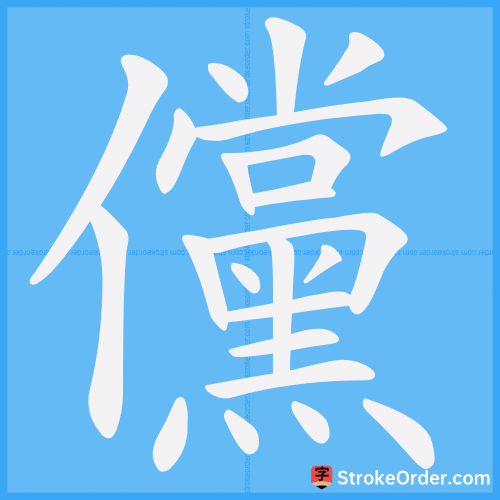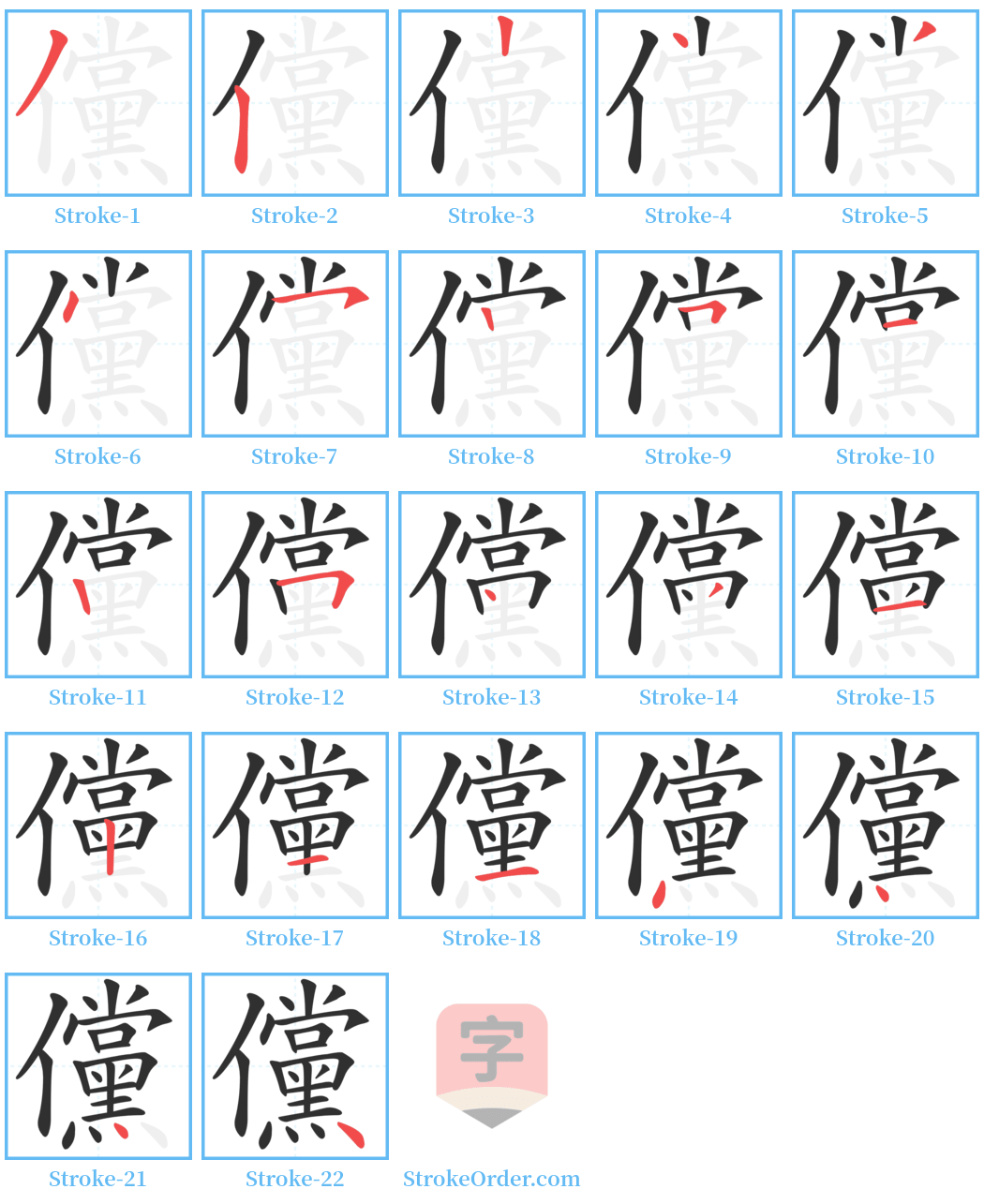儻 Stroke Order
Animated Stroke Order of 儻

Stroke Order Diagrams for 儻

Step-by-Step Handwriting Guide for 儻

Learn to Write Chinese Characters with Video Tutorials
Watch the video of writing the Chinese character "儻", learn the correct stroke order (笔顺) of the character "儻", and master the standard way of writing the character "儻".
Free Printable Handwriting Practice with Stroke Order: 儻
Printable Writing Practice Worksheet of "儻" in Portrait Orientation (Tian Zi Ge)

Printable Writing Practice Worksheet of "儻" in Landscape Orientation (Tian Zi Ge)

Information of 儻
Pinyin
tǎng
Radical
亻
Strokes
22 strokes
Usage
★★★
Definition
if / unexpectedly
儻
tǎng
1. 〔倜儻〕See “倜”.
(1. 〔Unconventional〕See "Ti".)
2. A state of absent-mindedness, as if lost.
(2. A state of absent-mindedness, feeling as if lost.)
Example: In "Zhuangzi • Tianzifang": "Zhang Hou was absent-minded, not speaking all day."
3. Adverb. Perhaps; maybe.
(3. Adverb. Possibly; perhaps.)
Example: In "Zihui • Renbu": "儻, a word of uncertainty." In "Records of the Grand Historian • The Family of Confucius": “In ancient times, Zhou Wen and Wu rose in Feng and Hao. Now Fei is small, maybe it is close to that!”
4. Conjunction. If; suppose. Indicates a hypothesis.
(4. Conjunction. If; suppose. Indicates a hypothesis.)
Example: In "Records of the Grand Historian • The Biography of Boyi": "If what is called the way of heaven is right or wrong?"
5. Commonly means "party". To be biased.
(5. Commonly means "party". To be biased.)
Example: In "Zhuangzi • Tianxia": "Time will be unrestricted and not biased."
6. Commonly means "lie down". To recline.
(6. Commonly means "lie down". To recline.)
Example: In Yuan unlisted works "Zhuan Kuai Tong" (First Act): "Reward me a bucket of fine wine and a shoulder of meat, so that I can enjoy and drunkenly lay around for half a month."
7. Commonly means "spill". To flow down.
(7. Commonly means "spill". To flow down.)
Example: In Jin’s "Dong Jieyuan • The Western Chamber's Various Palace Tunes" volume five: "I wish to hear what is like, this heart is pathetically spilling out a sea of troubles."
8. Commonly means "tang".
(8. Commonly means "tang".)
Example: In the Three Kingdoms, Wei's Ji Kang: "Being humble leads people; to pursue lofty words without reservation."
儻
tǎng
Meaning: Unconventional, akin to nonconformity.
1. Same as the original meaning (En: unconventional)
Example:
1. "Han Shu • Fu Chang Zheng Gan Chen Duan Zhuan": "Praise Chen Tang for being unfettered." Note: "Without morality."
2. "Han Shu • Shi Dan Zhuan": "His appearance is as if unrestrained."
2. A state of absent-mindedness, feeling lost.
(En: absent-minded)
Example:
1. “Zhuangzi • Tianzifang”: "Wen Hou was absent-minded, not speaking all day."
Example: "儻然" (a losing heart); "儻莽" (fallen into absent-mindedness).
3. Upright.
(En: upright)
Example: "儻言" (upright speech); "儻論" (lofty and just words).
4. Vast.
(En: broad)
Example: "儻漭" (broad and boundless); "儻閬" (vast and spacious); "倘莽" (wide expanse); "儻朗" (a vague or indistinct state).
5. Leisurely and contented.
(En: leisurely)
Example: "儻佯" (strolling leisurely); "儻儻" (living comfortably).
儻
tǎng
Conjunction. Indicates a hypothesis, equivalent to "if."
(En: if)
Example:
1. In "Records of the Grand Historian • The Biography of Boyi": "If what is said about the way of heaven is correct or not?"
Example: "儻若" (if); "儻使" (if).
儻
tǎng
Adverb. Accidentally, unexpectedly.
(En: by accident)
Example:
1. Ouyang Xiu's "New Book of Tang": "If one comes with honor and favor, can it be relied on to overpower others?"
Example: "儻來" (unexpectedly arrives); "儻然" (by chance; fortuitously).
1. By chance; unexpectedly.
(1. By chance; unexpectedly.)
2. Hope.
(2. Hope.)
3. A surname.
(3. A surname.)
1. By chance; unexpected.
(En: by chance; unexpected.)
Example: "Yupian • Renbu": "儻, fortune." "Zhengzi Tong • Renbu": "儻, sudden and unexpected."
2. Hope.
(En: hope.)
Example: "Jiyun • Dangyun": "儻, also means hope."
3. A surname.
(En: a surname.)
Example: "Wanxing Tongpu • Yangyun": "儻, seen in 'Surname Garden'."
1. Broad and impartial.
(1. Broad and impartial.)
Example: "Jiyun • Yangyun": "儻, meaning broad and impartial."
1. No intention to act.
(1. No intention to act.)
Example: "Jiyun • Yingyun": "儻, without intention." "Zhuangzi • Tiandi": "Losing what is said, 儻然 does not accept."